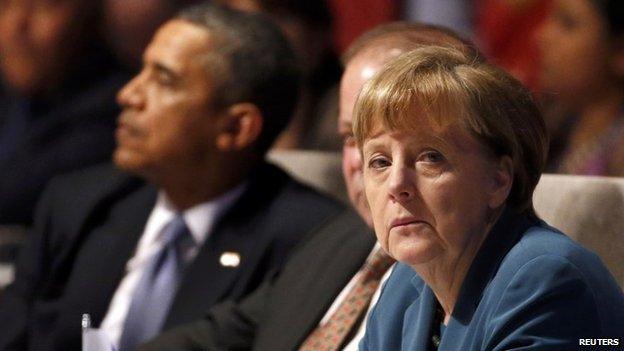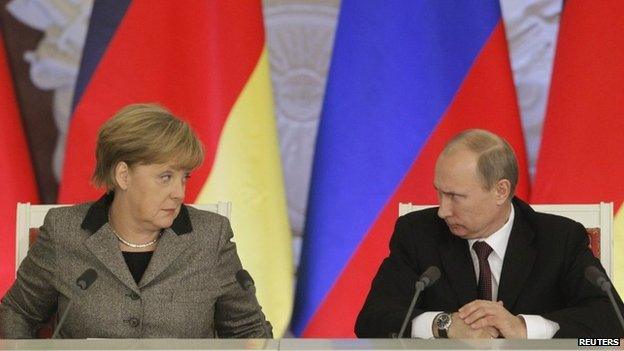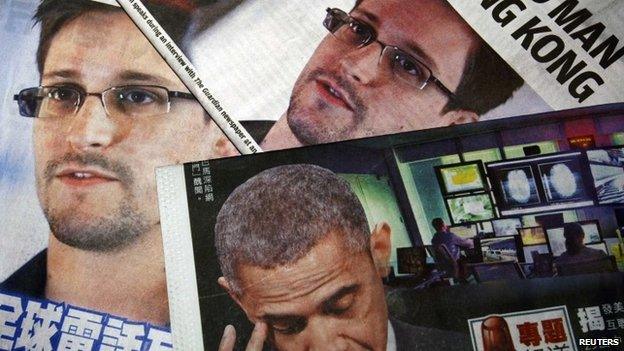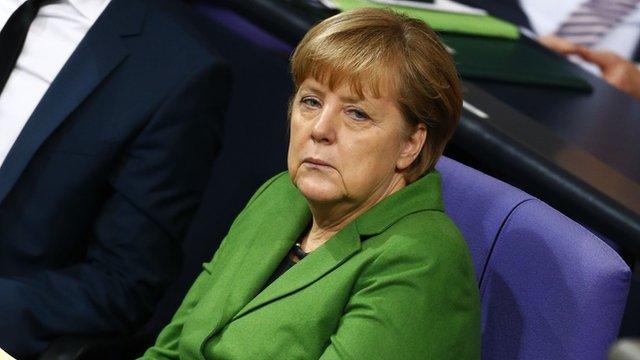PJ Crowley: A different agenda for US Merkel visit
- Published

Angela Merkel's 2014 visit to the US will be all business, unlike the more chummy past meetings
When German Chancellor Angela Merkel sits down for lunch on Friday with US President Barack Obama, Vladimir Putin and Ukraine will be the main course, and Edward Snowden the centrepiece.
Whether or not he is on the formal menu, Mr Snowden will certainly colour their conversation and the press conference that follows.
Ms Merkel's trip to the US is markedly different in tone and substance from her last visit to Washington in June 2011.
Back then, there was a state dinner during which Mr Obama presented her the Medal of Freedom.
He talked of a productive partnership with Ms Merkel, one of the few world leaders with whom he has established a warm connection. She referred to him more than once as "dear Barack".
This week's meeting is much shorter and will be all business.
Three years ago, the leaders spent considerable time talking about the Arab Spring in Tunisia, Egypt, Libya and Syria, and G8 efforts to support those democratic transitions.
They reiterated the desire to achieve negotiated settlements to the vexing challenges of the Iranian nuclear programme. They discussed the pending change in military strategy in Afghanistan and the need to overcome trade barriers and accelerate economic growth.
Three years later, the policy outlook is vastly different, although thankfully not all bad.
For example, not only are negotiations with Iran under way, there is a decent chance they will be successful. The war in Afghanistan is winding down.

Angela Merkel may be the only European leader who can influence Russian President Vladimir Putin
The Afghan presidential election is going surprisingly well. Whoever replaces President Hamid Karzai is likely to agree to a follow-on Nato mission there.
The most urgent regional transformation is not the Middle East, where an Arab Spring has, with the exception of Tunisia, become a humanitarian nightmare, but Ukraine, where Russian President Vladimir Putin has already overseen the redrawing of the European map and may be agitating for more.
There is no longer a G8, but a G7, trying to co-ordinate sanctions that impose costs on Mr Putin while minimising the impact on the European economy, not as easy a task as some suggest.
The costs to Mr Putin are increasing, even if the ramp is not as steep as pundits and even some government officials on this side of the Atlantic would prefer.
This week the US imposed a new round of sanctions on Russia's high tech sector and the EU quickly followed suit.
Such co-ordination is important since the lift over time will be much heavier in Europe. Its level of integration with Russia exceeds that of the US.
Mr Obama is right to be patient while maintaining firm pressure on Europe to move beyond its comfort zone.
Ms Merkel is not only crucial to meaningful European action, she is the only Western leader with real potential to influence Mr Putin. The Obama-Putin relationship has hit a brick wall.
She arrives in Washington undoubtedly stung that a German-led European monitoring team is being held by separatists in Sloviansk, Ukraine.
She has every right to expect Russia to use its influence to gain their release. The fact they have not is a clear indication of its intent to further escalate the crisis.
While in Washington, Ms Merkel will also meet the head of the International Monetary Fund, Christine Lagarde. As much as the crisis is about getting Mr Putin to stand down, it is about the need for Kiev to stand up, and for the West to redeem Ukraine's decision to integrate with the West.
A vital step in resolving the crisis is enabling Ukraine to conduct a free, fair and legitimate election on 25 May. This is the object of Mr Putin's agitation, to manipulate conditions in ways that favour Russia's interests and undermine Kiev's.
The West needs a comparable game plan to help Ukraine stand up a new government that Russia is unable to discredit.
The meeting should touch on the long-term strategic implications of the crisis. The US has done an effective job of reassuring Nato allies regarding their mutual security interests. The presence of Nato forces in Poland and the Baltic states is a welcome manifestation of that commitment.

It will take more than one meeting to repair the damage done to the Obama-Merkel relationship by revelations of NSA spying on the German chancellor
Mr Obama and Ms Merkel will discuss the Transatlantic Trade and Investment Partnership, which faces headwinds in both Europe and the US. It would be useful to make energy a centrepiece of these trade negotiations.
Several European countries, including Germany, rely heavily on Russian energy, which gives Mr Putin important leverage in the current crisis.
As US Secretary of State John Kerry told an Atlantic Council conference this week, the US has a new energy card in its policy arsenal. The Ukraine crisis presents a perfect opportunity to diversify Europe's energy sources over the next decade.
While Russia and Ukraine will dominate the discussion, Ms Merkel cannot afford to ignore the Snowden issue and neither should Mr Obama.
This is the first formal meeting between the two leaders since revelations that the US National Security Agency was monitoring her mobile phone. Americans should not underestimate the impact that the issue has had in Europe.
Europeans have welcomed the reforms that Mr Obama and Congress are considering. Even if the issue has receded from the headlines, Washington needs to follow through.
Ms Merkel herself has suggested it will take more than one meeting to repair the damage Edward Snowden's revelations have generated. This meeting is a necessary step in that process.
PJ Crowley is a former US assistant secretary of state and now a professor of practice and fellow at The George Washington University Institute of Public Diplomacy & Global Communication
- Published18 November 2013
